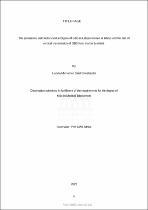| dc.contributor.advisor | Africa, Charlene | |
| dc.contributor.author | Elmahaishi, Lubna Mohamed Said | |
| dc.date.accessioned | 2022-08-18T13:31:05Z | |
| dc.date.available | 2022-08-18T13:31:05Z | |
| dc.date.issued | 2022 | |
| dc.identifier.uri | http://hdl.handle.net/11394/9266 | |
| dc.description | Magister Scientiae (Medical Bioscience) - MSc(MBS) | en_US |
| dc.description.abstract | Group B Streptococcus (GBS) also known as Streptococcus agalactia, is one
of the most important causes of serious neonatal infections. Early detection of GBS
colonisation in the mother is thus of primary importance to prevent neonatal infection.We assessed 200 pregnant women at labour at Said Hospital in Misrata, Libya
between July 2020 and May 20201. Two samples (vaginal samples and rectal samples) were
collected from 100 mothers delivering preterm and 100 mothers delivering full term, as well
as one sample from the infant at birth. | en_US |
| dc.language.iso | en | en_US |
| dc.publisher | University of the Western Cape | en_US |
| dc.subject | Neonatal infections | en_US |
| dc.subject | Bioscience | en_US |
| dc.subject | Streptococcus agalactiae | en_US |
| dc.subject | Group B Streptococcus (GBS) | en_US |
| dc.subject | Libya | en_US |
| dc.title | The prevalence, risk factors and serotypes of GBS in Libyan women at labour and the rate of vertical transmission of GBS from mother to infant | en_US |
| dc.rights.holder | University of the Western Cape | en_US |

